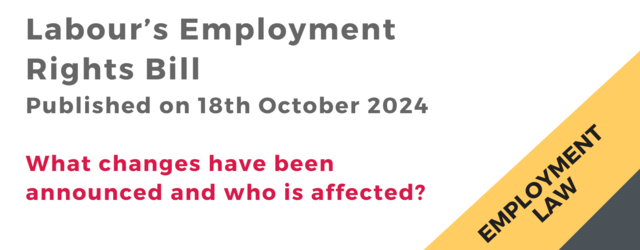
An Office Romance - What Employers Should Be Aware of When Managing Relationships at Work
Discover how employers can effectively manage office romances while respecting privacy, preventing conflicts of interest and meeting the duty to prevent sexual harassment. Banner Jones’ Employment Law specialists provide guidance, policies and training to keep your workplace compliant and protected.

Autumn Budget 2025: What It Means for Businesses and Individuals
Discover how the Autumn Budget 2025 impacts businesses and individuals, and why legal advice is essential for compliance and planning.

Labour’s Employment Rights Bill: What changes have been announced and who is affected?
The Labour government’s new Employment Rights Bill (published on 18th October 2024) introduces significant changes that aim to improve job security, expand worker protections, and increase flexibility for millions of employees across the UK. Katie Ash, Head of Employment Law at Banner Jones, breaks down some of the key changes and explains who will be affected.

How to calculate holiday pay in 2024: an update on legislative changes
For many businesses, calculating holiday pay is a straight-forward process. Employers are, within the parameters of the law, able to dictate how many annual leave days or hours a staff member is entitled to.

Selling a Business - A Complete Guide
There are many factors to consider when selling a business and it isn’t something that should be entered into lightly. Our free guide runs through some of the important considerations this involves.

Employment Law - Changes employers need to be aware of
As we enter 2024, we’ve been reflecting on some of the significant changes in employment law we have seen over the course of 2023 which employers need to be aware of. These include amendments to the flexible working regime, further deliberations about employment status by the Supreme Court and considerable changes to the calculation of holiday pay. 2024 looks set to be a big year for change in employment law, so here we have done a roundup of key developments in 2023 and have highlighted the ‘ones to watch’ in 2024.

Business Legal Services Team
Our Business Legal Services team pride themselves on being able to offer high quality ‘city style’ advice in a user friendly, cost effective manner to local, national and international businesses.

Are Restrictive Covenants too harsh?
Would removing non-compete clauses improve worker’s rights? Theoretically, they’re supposed to be in place for C-suite level employees to prevent them taking business secrets to competitors. So, is it necessary to make low-level workers sign non-competes too? Is it too harsh?

Business First Magazine Spring 23
In this issue we cover lots of topical business issues and challenges from Mergers, Layoffs, Going Global, Commercial Property and more

Holiday pay ruling upheld for part year workers
Holiday pay for those who work only part of the year and have no contractually set hours should be calculated on the basis of average earnings, the Supreme Court has confirmed.

How to avoid an Employment Tribunal
The cost of defending Employment Tribunal cases can vary significantly and could cost your business anything from £10,000 to £50,000. Then if the claimant is successful, there will be the cost of compensation on top of this. The average award for an unfair dismissal case in the UK is a little under £7,000, with claims resulting from discrimination costing significantly more. Businesses also need to consider the hidden cost of employment law claims caused by the damage it can do to their reputation as an employer and as a business that clients and customers want to work with. Often this cost can be more damaging than the award itself.
.

Recruitment - How to get it right
In our latest blog Head of Employment Law, Katie Ash, goes through the eight key steps to lawfully recruiting someone into your business. It can be a costly mistake to ignore the rules and get this wrong.

Gender Pay Gap Reporting: Your Questions Answered
Over time, the gap between women’s and men’s median hourly earnings has been narrowing. In fact, according to the Office for National Statistics (ONS) it has fallen by over a quarter among full-time employees in the last decade.

What is the Good Work Plan and why does it matter?
For many, 2020 will go down in history as the year that changed everything, and one of the most significant changes was the way in which we work.

How best to prepare for outbreaks of sickness in the workplace
When the first cases of the novel Coronavirus (COVID-19) were reported last month, it was widely assumed it would run its course relatively quickly, with a minimal number of people affected resulting in little impact on the UK economy.



